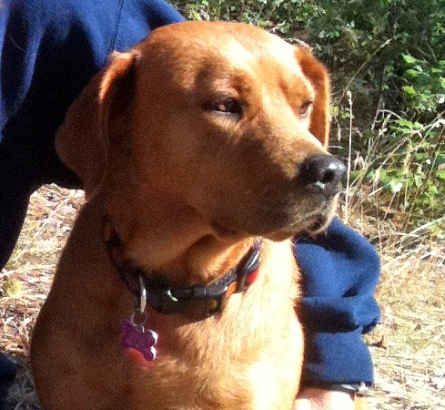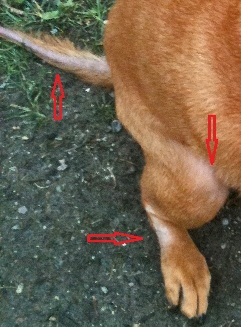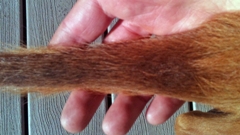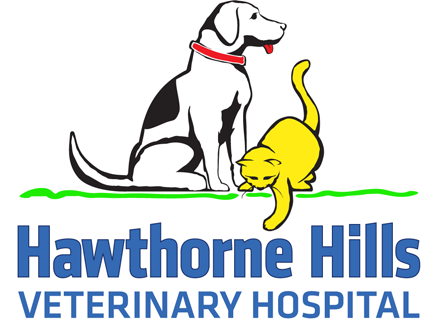
This month the doctors at Hawthorne Hills Veterinary Hospital in Seattle, WA are bringing attention to a very common disease that affects dogs – hypothyroidism.
Georgia is a mixed breed dog who will be celebrating her 7th birthday soon and has found a new zest for life. She has been a generally healthy dog but not particularly active or energetic. Her owners thought that this was just her normal personality.
 Two months ago Georgia was seen by Dr. Robin Riedinger for her routine preventive health exam. As part of the visit, in addition to a full physical exam, we evaluated Georgia’s skin and hair coat. She was missing a significant amount of hair along the sides of her rear legs, and the fur was missing from most of her tail. Georgia did not have fleas, and there was no evidence of itching, chewing, or skin sores.
Two months ago Georgia was seen by Dr. Robin Riedinger for her routine preventive health exam. As part of the visit, in addition to a full physical exam, we evaluated Georgia’s skin and hair coat. She was missing a significant amount of hair along the sides of her rear legs, and the fur was missing from most of her tail. Georgia did not have fleas, and there was no evidence of itching, chewing, or skin sores.
The bald patches and pattern of hair loss, especially the appearance of a “rat tail” was very suspicious for Hypothyroidism in dogs. We tested Georgia’s blood and found that her thyroid levels [T4 and FreeT4] were almost undetectable, despite her body producing high levels of Thyroid Stimulating Hormone [TSH]. Her body was trying to tell the thyroid gland to produce more hormone; unfortunately the factory just wasn’t able to respond.
We started Georgia on Soloxine, a synthetic medication to replace the thyroid hormone; beginning with a low dose at first and then gradually tapering Georgia’s dose up a week at a time to allow her body to adjust. Within three weeks her owners reported that Georgia was showing signs of improvement and she was not having any negative effects to the medication.
 Six weeks after starting the Soloxine we checked Georgia’s thyroid blood level and it was finally in the low normal range. We will continue monitoring her blood levels and adjusting the dose of medication over the next several months. Once we identify the best dose for Georgia this medication will be necessary for a lifetime.
Six weeks after starting the Soloxine we checked Georgia’s thyroid blood level and it was finally in the low normal range. We will continue monitoring her blood levels and adjusting the dose of medication over the next several months. Once we identify the best dose for Georgia this medication will be necessary for a lifetime.
Georgia’s owners have been amazed at the transformation.  They remarked that since starting the Soloxine Georgia has been a “new dog”, showing energy they hadn’t seen in a very long time, playing with her dog pal at home, and best of all, Georgia is sporting a softer prettier fur coat.
They remarked that since starting the Soloxine Georgia has been a “new dog”, showing energy they hadn’t seen in a very long time, playing with her dog pal at home, and best of all, Georgia is sporting a softer prettier fur coat.
The thyroid gland produces hormones that help regulate body metabolism; when the body fails to produce sufficient levels, there are a variety of changes that can occur. The symptoms and signs associated with Hypothyroidism vary with the patient and commonly include weight gain, low energy, poor hair coat and/or hair loss, and sometimes recurrent skin infections. With people, if our thyroid level is low we have a very difficult time functioning on a daily basis. Surprisingly many dogs do not show all of the classic signs that occur with people, and it can be easy to miss cases of Hypothyroidism. This is one of the reasons that the veterinarians at Hawthorne Hills Veterinary Hospital in Seattle believe in the benefits of routine physical exams, and diagnostic testing. It is very rewarding the find a problem that can be so easily treated and one that makes such a dramatic difference to the patient and to their owners.
To read more about Hypothyroidism in dogs click on this link to VeterinaryPartner.com. To schedule your appointment with our Seattle veterinary hospital, call us at 206-528-1980
http://www.veterinarypartner.com/Content.plx?P=A&S=0&C=0&A=461

